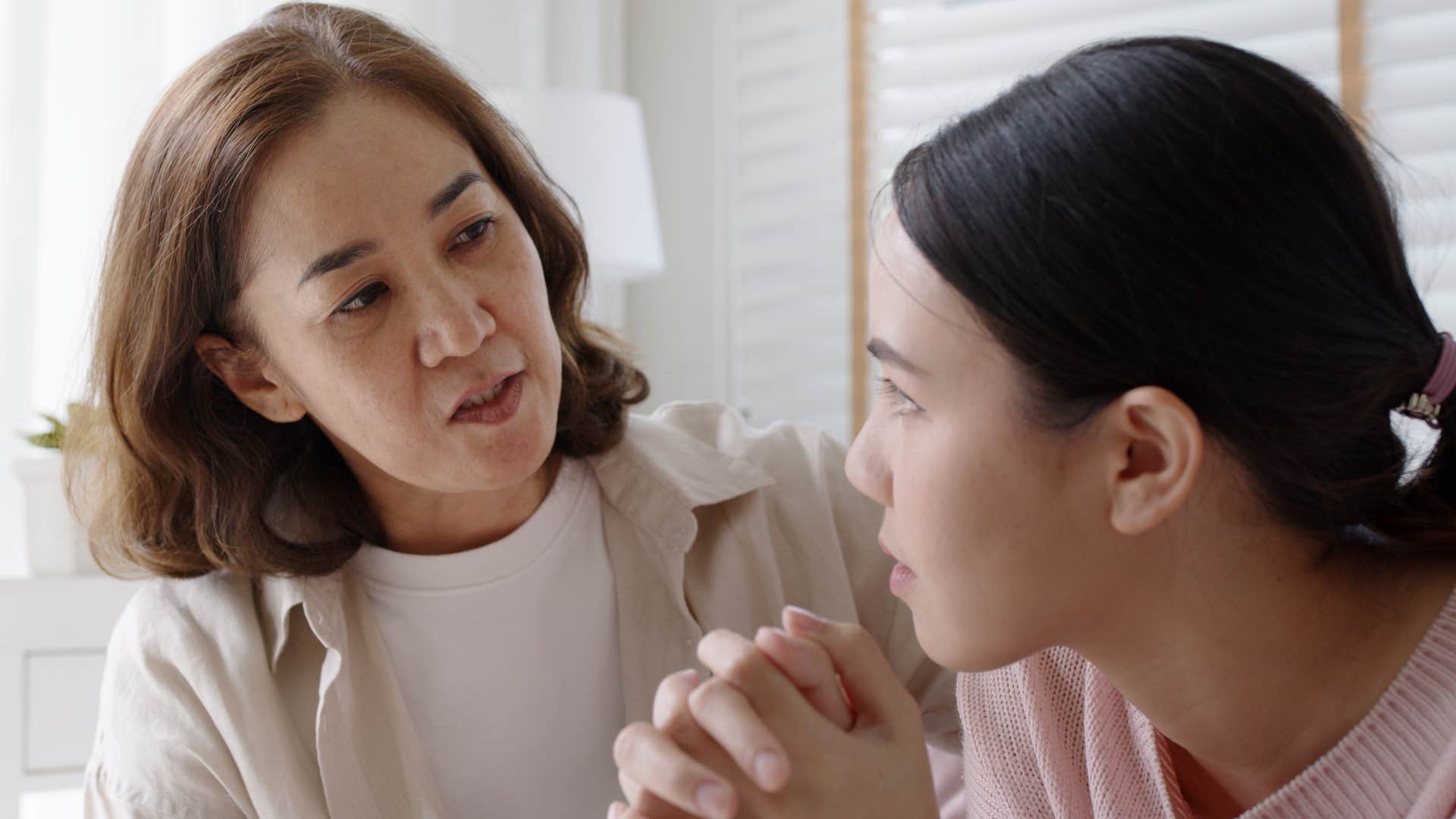Adults Who Blame Their Parents For All Their Problems Use These 11 Phrases Pretty Much Every Day
Adults who use these phrases refuse to take true accountability.
 Creative Photo Corner / Shutterstock
Creative Photo Corner / Shutterstock When adults cultivate a “growth mindset” in adulthood and view their mistakes as an opportunity for personal growth and education, even the most uncomfortable situations can have a bright side. Even when it comes to issues like childhood trauma, taking accountability in framing one's own adult life can ensure you feel empowered to live the life you want.
However, some adult children struggle with this kind of self-assuredness, accountability, and growth, instead blaming everyone else for their own struggles and guilt-tripping people into meeting their needs. Even in passing conversations within a family, adults who blame their parents for all their problems use these phrases pretty much every day to excuse their own lack of self-control and action.
Adults who blame their parents for all their problems use these 11 phrases pretty much every day
1. ‘My parents never taught me that’
 GaudiLab | Shutterstock.com
GaudiLab | Shutterstock.com
Both positive and negative childhood experiences play a role in setting kids up for adulthood, according to a study published in the BMC Public Health journal. If their parents don’t meet their needs and craft transactional relationships, they’re more likely to struggle with building relationships as adults. If they meet their every need but forgo teaching gratitude practices, they often grow entitled.
However, even if a person’s parents fell short or made mistakes when parenting their kids, that doesn’t immediately doom their entire adult life. They may have to put more time, energy, and effort into rebuilding their self-esteem, healing trauma, and finding support. Still, if they continue to live an unhappy, unhealthy, and unfulfilling life, that blame isn’t entirely on their parents' shoulders.
Yet, entitled adults who cannot take accountability for their own lives will often use phrases like “you made me this way” or “my parents never taught me that” to shift blame off of themselves and onto their families.
2. ‘I didn’t ask to be born’
 Fizkes | Shutterstock.com
Fizkes | Shutterstock.com
Adults who blame their parents for all their problems and refuse to take accountability themselves often use phrases like “I didn’t ask to be born” to guilt their parents into doing everything for them.
While several factors play into this kind of entitlement in adult children, a study published in the Family Relations journal argues that it’s often “helicopter” or overprotective parenting styles that spark it from a young age. Their parents are so overbearing that they don’t teach their kids emotional regulation, independence, or decision-making skills on their own.
When they become adults, it’s not uncommon for their adult kids to weaponize that entitlement back, expecting their parents to meet every need, solve every problem, and take the blame for all their struggles.
3. ‘That’s just how I was raised’
 Fizkes | Shutterstock.com
Fizkes | Shutterstock.com
Many entitled adult children will use phrases like “that’s just how I was raised” to justify their misbehavior and shift blame onto their parents for their own conscious mistakes as an adult. Of course, it’s not always easy to take responsibility for mistakes and hurt, but in the end, it’s truly accountable people who learn and grow from them, not those who shift blame.
They’ll do anything to protect and defend their own self-image, even if it means throwing their parents or childhood experiences under the bus.
4. ‘I was set up to fail’
 Chay_Tee | Shutterstock.com
Chay_Tee | Shutterstock.com
Part of the reason why adult children are becoming estranged from their parents later in life is due to a lack of communication skills and empathy. It’s possible to have open and supportive conversations about childhood trauma as a parent without necessarily agreeing with how your behavior causes harm. Yes, childhood trauma and healing from it affect adult children’s lives, but completely blaming parents for all struggles later in life is unfair.
Phrases like “I was set up to fail” can help provide healthy adults with a framework to heal, but using them to guilt-trip and shame parents consistently without making any personal change themselves is often more harmful than it seems.
5. ‘I don’t have parents to support me’
 GaudiLab | Shutterstock.com
GaudiLab | Shutterstock.com
Even if their parents aren’t around or they don’t have a family support system, adults still find a way to blame their parents for a lack of accountability and autonomy. Of course, unresolved childhood trauma and a lack of support can have several consequences on a person's mental health, self-esteem, and relationships later in life, but that doesn’t mean it’s a chronic excuse to evade accountability.
People who expect everything good to fall in their laps and for everyone else to solve their problems for them often live stagnant lives. They grow resentful in their relationships and isolate themselves from meaningful connections because they refuse to acknowledge that they’re in the driver’s seat of their own actions, behaviors, and lives.
6. ‘I can’t have healthy relationships because of you’
 SynthEx | Shutterstock.com
SynthEx | Shutterstock.com
In no way, shape, or form are these phrases a means to dismiss and invalidate the true struggle of childhood trauma. In fact, according to a study published in Frontiers in Psychology, adult children with unresolved childhood trauma and unmet needs from earlier in life do tend to struggle with forming healthy adult connections down the road.
However, that doesn’t mean that kids with bad parents or childhood trauma are stuck in a cycle of toxic relationships forever. Whether it’s therapy, support, or other practices, there are many ways for adult children to take control of their own lives and heal from the childhood trauma that may currently be sabotaging their relationships.
That’s why adults who blame their parents for all their problems are often misguided in using pointed phrases like this every single day. Offering space for parents to take accountability and communicate through childhood experiences is great, but when it becomes an avenue to evade responsibility for their adult lives, it’s less helpful.
7. ‘It’s not my fault’
 Fizkes | Shutterstock.com
Fizkes | Shutterstock.com
Many adults who use phrases like “it’s not my fault” to avoid apologizing to people they’ve hurt or to justify their toxic habits tend to blame their parents for not being the right kinds of role models and parents. Of course, the modeled behavior our parents reveal to us as kids plays a role in structuring our beliefs and habits later in life, but using their behavior as an excuse to take no personal initiative to change is harmful.
Even if you grew up with bad parents, in a toxic home environment, or grappling with trauma, there’s still room for you to grow, heal, and progress as an adult. Your trauma and those experiences may never leave you, but they don’t completely hinder you from taking responsibility and enacting growth.
8. ‘Nobody taught me how to handle money’
 Fizkes | Shutterstock.com
Fizkes | Shutterstock.com
Adult children who are openly taught about money and equipped with financial literacy as kids tend to have more stability with money later in life, according to a study published in the Journal of Family Issues. They also build stronger relationships with their parents, because they’re not navigating financial contributions, lending situations, and financial insecurity that negatively impact their family dynamic.
However, even adult children with a lack of financial literacy can learn to thrive in adulthood with money, especially if they have the general emotional support of their families to lean on. But when they weaponize phrases like “nobody taught me how to handle money” to blame their parents, that emotional foundation can also be sabotaged.
9. ‘It’s your responsibility to take care of me’
 Krakenimages.com | Shutterstock.com
Krakenimages.com | Shutterstock.com
Even for parents who provide everything for their kids in adulthood, from childcare to housing and even financial support, they could be harming their sense of autonomy and independence. The most entitled adult children don’t know how to build resilience through struggle, because they instead blame everyone else for their problems and expect handouts.
That's why adult children who blame their parents for all their problems often use phrases like “it’s your responsibility to take care of me” to guilt-trip them into getting what they want. They’d prefer to lean on their parents, even at the expense of their own confidence, resilience, and growth.
10. ‘I should be your priority’
 Fizkes | Shutterstock.com
Fizkes | Shutterstock.com
Adult children benefit from taking constructive action in their lives, according to parent coach and psychologist Jeffrey Bernstein. Yet, many still blame their parents for all their troubles, even well into adulthood. They take their struggle, resentment, and angst out on their parents, picking apart their mistakes and weaponizing their insecurities, to avoid their own discomfort.
Nobody is perfect — parents make mistakes. So, in order for parents to protect themselves against being blamed and taken advantage of by their kids, they need to forgive themselves for the hurt they’ve caused. If that means apologizing, they should, but if it means creating boundaries with their kids, that can also be powerful.
To be the best parents to adult children they can be, they shouldn’t feed into phrases like “I should be your priority,” but instead build their own life, empower their kids into independence, and set boundaries where they can.
11. ‘Other people’s parents pay for everything’
 ALPA PROD | Shutterstock.com
ALPA PROD | Shutterstock.com
Whether it’s rent, tuition, student loans, or even help with childcare, adults who blame their parents for all their problems use phrases like “well, everyone else’s parents pay for everything” pretty much every day. They often compare their own circumstances to those of their parents, even if their lives, financial well-being, and relationships look entirely different.
Of course, even if it seems like a personal attack for these entitled adults, most people who lend money to family and loved ones end up dealing with several consequences. According to a Bankrate study, lending money to loved ones ends badly for nearly half of Americans, so not getting financial help from others isn’t all bad.
Zayda Slabbekoorn is a staff writer with a bachelor’s degree in social relations & policy and gender studies who focuses on psychology, relationships, self-help, and human interest stories.

